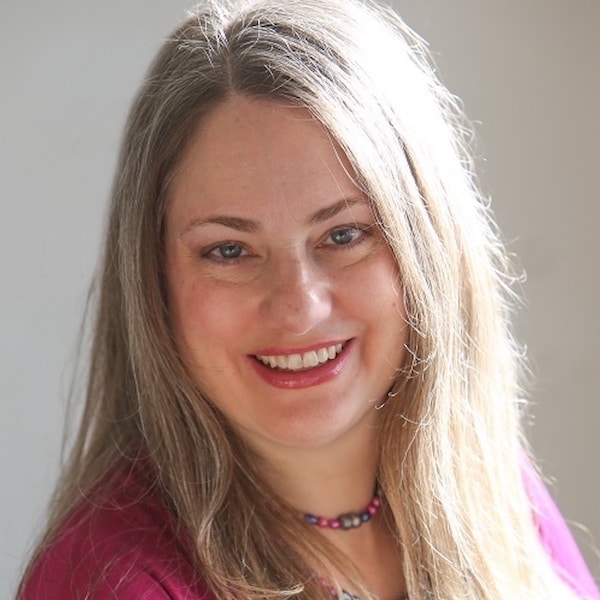I was raised almost entirely without religion. My mother was raised Irish Catholic and by the time I was growing up she was a practicing Buddhist. My father was raised German Lutheran but ultimately ended up somewhere around the atheistic end of the religious continuum, but with a healthy dose of reverence for nature. Neither parent gave much conventional religious training. The lack of it gave me a perspective on life that was often very unlike the people around me.
When I was still a fairly small child, I noticed that one of the differences between my family and my friends’ families was that they went to church and we didn’t. This seemed like a very important difference at the time and I visited my friends’ churches with great interest. This was rural Pennsylvania, so yes, they were churches. Not many synagogues and definitely no mosques or temples. I saw that there were many religions in the world and many varieties within each religion, and that each of them believed that they had the capital-T truth. This was odd because their “truths” often contradicted each other—sometimes severely.
Followers of each religion believed in an afterlife, and were certain of who would welcome them when they died. Good Christians expected to go to a place they called “heaven,” to be greeted by St. Peter, led through the Pearly Gates and taken to Jesus, or Mary or perhaps God himself. Others believed in Allah, Buddha, or more abstract things like nirvana, and so forth. I was fascinated by the depth of their belief in these stories.
I never quite believed any one of the stories myself. I did believe in some sort of continuation after death—the difference between a living body and a dead one is quite profound and I figured that there had to be something in the body that left at death. I just didn’t know what that something was or what it could expect. How was it all handled after people died? Did people all go to different heavens? Or the same heaven? Was there someone there to debrief them when they arrived, to tell them, “No, I’m sorry, everything they taught you was wrong. There’s no Christ here, and this isn’t the heaven they told you about in Sunday school”? Somehow I didn’t think so. In fact, I thought that would be terribly cruel. For me, the sheer variety of religious beliefs and the very intensity with which they were embraced by people who were all quite certain that their beliefs were the only correct ones, while all others were flat-out wrong, and the very willingness of generations upon generations to die and kill for something as insubstantial as a belief—all this put together was sufficient proof to me that in fact, none of them could possibly be right. Only a reality large enough to hold all the other realities could possibly be the “real” one. And that it must in fact be so large that a human brain could not even think about it fully, or hold the concept in her mind. It had to be, strictly speaking, unknowable. So I gave up on knowing, but continued speculating, realizing all the while that whatever understanding I apprehended would be, at best, a substitute for the actual thing, and should be viewed as such. At the very least I had grasped that true religion must necessarily be incomprehensible or it would not be large enough to be true.
I decided, in my own childish way, that somewhere up in the sky (which is where I vaguely located things metaphysical) there was a Great Cosmic Machine, a sort of generator that generated all the heavens for all the people who believed in them. I decided that, when a person died, his spirit would fly into a manufactured world that matched his expectations. Everything he expected would be there. Sometimes I thought this afterworld would be manufactured by his own imagination, like a dream you never wake from. There the person would remain as long as he wished to—perhaps until he grew bored of playing a harp and wearing white.
After the boredom set in, a person would figure out that the heaven they were in was not all there was, and would go looking for something more. At that point they could be taken to the One Who Ran The Machine. I had very vague ideas of this person, but I was certain that this One was a being of very great compassion and patience to go to the trouble of creating all these illusory heavens for people to go to, so that they could be let down easy. As if dying itself is enough of a shock, so why compound it with a grand disillusionment of everything you’ve ever believed?
Because I didn’t believe in any heaven in the first place, I figured that when I died, the dream would try to form around me, and it would fail. Rather than getting caught in any of the false afterworlds, I would bypass them all, and go straight to the One Behind It All.
After seeing The Wizard of Oz, I think I drew a parallel between those illusory heavens and the great pomp and display of the Wizard. The Wizard appears to be large, all-knowing and all-wise, but all those amazing pyrotechnics were actually being run by the little man behind the curtain, himself rather mortal and drab. “Pay no attention to the Man Behind the Curtain!” bawled the phony, pompous Wizard. I wanted to head straight for the curtain. I knew that was where I could find out what was really going on.
Over the years since then, I have found astrology and engaged in years of study, observation and experience using my birth chart and applying the information it contained to my life. I have found in astrology the very mechanism I was seeking—the Great Machine I had fondly imagined, knowing it was also not the absolute truth, but gleaning more from the metaphor than I could from anything that pretended to absolute truth. Unlike religions, astrology asks not for your faith. To those who will learn how to look, it withholds no facts. And we are free to make use of those facts as we will, employing our imaginations and our human artistry to discover what the symbols say about how to live. Astrology does not require worship in order to work—it is consummately a science and an art, but it is not a religion. This is only part of why I love it so.
Astrology shows us the workings of the universe, its very mechanism. With astrology, we are able to see unfolding before us the cycles and rhythms of nature, the organic patterns. We are able to see in those patterns a parallel to our own lives, on many levels: on the physical, the emotional, the mental, the spiritual, the eternal. By watching the heavens and watching our lives, we are able to draw correspondences, and because we see parallels between the patterns of our lives and the cycles of the heavens, we are able to see ourselves within the larger design, we are able to predict the future and also to alter it. We can see trends, likelihoods, possibilities, and change our paths accordingly.
The Machine I imagined is not God, or nature, or even the Mind of God. It is something more than, and inclusive of these things. It plays out all patterns over time. To have the ability to read these patterns through astrology is the greatest gift I can imagine—and one laden with responsibility.
While I was growing up, one of the hardest things to watch my friends endure was the way their religions couldn’t explain tragedy. Why do terrible things happen to good people? Why do murderers exist? How can there be so much suffering in a world watched over by a theoretically benevolent deity? And if God isn’t benevolent, why is he so angry and selfish? When human beings are angry and selfish, it’s because something went wrong somewhere. But if God is all-powerful, how can he allow something to go wrong? It seems that either God is powerless, but good or he is all-powerful and mean. And why conceive of God as a person anyway? These simple questions demand answering and come out of the mouths of babes the world over. No adult can explain these things to a child, so they prevaricate and make up stories to inculcate a simplified moral system. But nothing that can’t be explained in language simple enough for a child to understand can possibly be true and children know this. It’s why religions require force.
Everyone who has ever prayed knows the frustration of lacking a two-way conversation with God. Everyone who believes in a God will desire, at some point, to speak to him and to get a clear response. Even those folks who believe that God speaks to them do not hear him as often as they would like to. This lack of a clear response drives humans crazy. Humans invent reasons why God can’t talk back and none of them are good reasons. Anthropomorphizing a deity only makes this worse. I understand that most adults view the concept of God as a place-marker for a bigger, more unknowable concept, however even adults fall prey to the trap of mistaking the metaphor for the meaning. An anthropomorphic god is a child’s view of reality, but without a child’s clarity. I guess I’d just rather do without, even if it means continually being reminded that I don’t really understand the universe and facing uncertainty every day.
But a lack of belief in an anthropomorphic god has not stopped me from searching for that quality I was looking for: “the two-way radio to God.” (you see how easy it is to resort to the place-marker again?) In studying astrology over many years, I have come to understand that the movements of the planets and signs and the way they correlate to human events constitute the very conversation I was looking for. These things are God talking back. Where the Bible says, “God sees every sparrow fall,” I would say “God is every sparrow falling, as well as the air the sparrow falls through and the earth it lands upon.” Except that I would somehow get the word God out of the sentence too. It is ineffable and boggles the mind very quickly, so I generally don’t bother.
It is a great power, this being able to read the language of the stars. Through astrology, we draw nearer to an understanding of the workings of the universe. The natural cycles of the universe are the cycles of our lives. The cycles, us living them and the events that play out are all God-in-motion. The buds of spring are a message from God, a message of hope and renewal. The autumn leaves are a message of impending death and loss, tinged with beautiful sorrow. The moon speaks to us of how we can light our own darkness and how changeable we are. When we observe the similarities among people born when Venus was rising in the east, we understand that such people are messengers of love, relatedness and sexuality, while people similarly marked by Mars rising are messengers of strength, drive and forcefulness. All these messages, taken together, are God. Sometimes you are the recipient of the message, sometimes you are the messenger, sometimes the message itself. When the whole thing clicks together in your mind you realize you are inextricably connected to everything. It’s a wonderful cure for modern existential loneliness (and a permanent one).
Astrology allows us to read these messages, to break them down into pieces a puny human brain can understand. An understanding of the cycles of nature leads to an examination of the corresponding cycles of our own lives and thus leads us to an understanding of our most inner, divine selves. Through astrology, we are in conversation with God. And when “he” speaks, we can “listen” and we can actually “hear” him.


